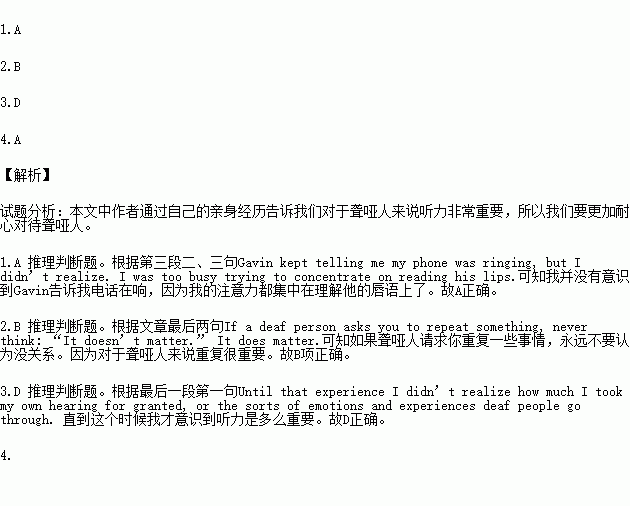题目内容
As I walked along the Edgware Road, I felt as though the world was closing in on me. All the sounds I take for granted, had gone. I had entered a world of silence. This unsettling experience occurred a few weeks ago when I agreed to go deaf for the day to support the work of the charity Hearing Dogs for Deaf People, for which I am an ambassador.
When I managed to take a cab to the office of my manager, Gavin, I couldn’t hear what the taxi driver was saying to me. Conversation was impossible. Then, when I reached the office, I had to ring the intercom five times as I couldn’t hear a response.
Everybody said I was shouting at them--- I simply wasn’t aware of how loudly I was speaking as I couldn’t hear my own voice. Gavin kept telling me my phone was ringing, but I didn’t realize. I was too busy trying to concentrate on reading his lips. And when he tried to tell me a code to put into my phone, I had to keep asking him to repeat it, more slowly. Eventually he lost his patience and snapped at me: “Just give me the phone!” I was shocked.
People couldn’t be bothered to repeat themselves, so they kept trying to do things for me that I was perfectly capable of doing myself. I felt I’d lost control.
Being deaf for the day was extraordinarily tiring. I had to work so hard to “listen” with my eyes, get people’s attention and use my other senses to make up for my lack of hearing. It was a huge, exhausting effort.
Until that experience I didn’t realize how much I took my own hearing for granted, or the sorts of emotions and experiences deaf people go through. If a deaf person asks you to repeat something, never think: “It doesn’t matter.” It does matter.
1.Why did the author focus on reading Gavin’s lips?
A. By doing this he could understand what Gavin was saying.
B. He wanted to be aware of what the code was.
C. He attempted to get the code into the phone by himself.
D. He didn’t want to bother Gavin to repeat what he was saying.
2.What advice does the author give in the passage?
A. Speak at the top of your voice if you can’t hear others speaking.
B. Repeat things as slowly as possible for the deaf.
C. Take your own hearing for granted.
D. Do as many things as possible for the deaf.
3.What can be inferred from the passage?
A. It’s boring to live in a world of silence.
B. The author has to use gestures to communicate with his friends.
C. There are many other ways to help the deaf understand others.
D. Many ordinary people just take hearing for granted until they lose it.
4.What can be the best title of the passage?
A. Helping the Deaf with More Patience
B. Don’t Take Your Hearing for Granted
C. Listening with Eyes
D. The Importance of Reading Lips
 天天向上一本好卷系列答案
天天向上一本好卷系列答案 小学生10分钟应用题系列答案
小学生10分钟应用题系列答案
